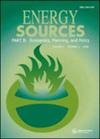检讨建筑物能源标准的能源效益规定:可持续能源消耗的影响
IF 2.2
4区 工程技术
Q3 ENERGY & FUELS
Energy Sources Part B-Economics Planning and Policy
Pub Date : 2022-07-07
DOI:10.1080/15567249.2022.2084184
引用次数: 1
摘要
建筑规范和标准中的能效因素是规定建筑物提高其能效的关键组成部分。这项研究的目的是优先考虑这些重要的能源效率因素。本研究的动机来自能源设计和执行专业人员,他们面临着选择某些能源因素的挑战,这些因素可能导致对其他因素的权衡。采用模糊集理论和决策试验与评价实验室(DEMATEL)方法得到了结果。一个优先的能源效率因素的排名列表是本研究的关键贡献之一。我们证明了能源效率因素可以根据其重要程度进行评估。结果表明,室外和室内气候条件、空调系统、建筑朝向和通风是影响建筑能效的四个最重要和排名最高的因素。本文章由计算机程序翻译,如有差异,请以英文原文为准。
Examining energy efficiency requirements in building energy standards: Implications of sustainable energy consumption
ABSTRACT Energy efficiency factors in building codes and standards are crucial components that are prescribed to buildings to augment their energy efficiency. The objective of this study was to prioritize these vital energy efficiency factors. The present study derives its motivation from energy design and execution professionals, who face the challenge of selecting certain energy factors that may result in a trade-off over other factors. A fuzzy set theory with a decision-making trial and evaluation laboratory (DEMATEL) methodology was employed to obtain the results. A ranked list of prioritized energy efficiency factors is one of the key contributions of this research. We demonstrate that energy efficiency factors can be evaluated according to the degree of their importance. Based on the results, it was concluded that outdoor and indoor climatic conditions, air conditioning systems, orientation of buildings, and ventilation are the four most significant and highest-ranked factors that affect the energy efficiency of a building.
求助全文
通过发布文献求助,成功后即可免费获取论文全文。
去求助
来源期刊

Energy Sources Part B-Economics Planning and Policy
ENERGY & FUELS-
CiteScore
6.80
自引率
12.80%
发文量
42
审稿时长
6-12 weeks
期刊介绍:
12 issues per year
Abstracted and/or indexed in: Applied Science & Technology Index; API Abstracts/Literature; Automatic Subject Index Citation; BIOSIS Previews; Cabell’s Directory of Publishing Opportunities in Economics and Finance; Chemical Abstracts; CSA Aquatic Science & Fisheries Abstracts; CSA Environmental Sciences & Pollution Management Database; CSA Pollution Abstracts; Current Contents/Engineering, Technology & Applied Sciences; Directory of Industry Data Sources; Economic Abstracts; Electrical and Electronics Abstracts; Energy Information Abstracts; Energy Research Abstracts; Engineering Index Monthly; Environmental Abstracts; Environmental Periodicals Bibliography (EPB); International Abstracts in Operations Research; Operations/Research/Management Science Abstracts; Petroleum Abstracts; Physikalische Berichte; and Science Citation Index.
Taylor & Francis make every effort to ensure the accuracy of all the information (the "Content") contained in our publications. However, Taylor & Francis, our agents, and our licensors make no representations or warranties whatsoever as to the accuracy, completeness, or suitability for any purpose of the Content. Any opinions and views expressed in this publication are the opinions and views of the authors, and are not the views of or endorsed by Taylor & Francis. The accuracy of the Content should not be relied upon and should be independently verified with primary sources of information. Taylor & Francis shall not be liable for any losses, actions, claims, proceedings, demands, costs, expenses, damages, and other liabilities whatsoever or howsoever caused arising directly or indirectly in connection with, in relation to, or arising out of the use of the Content. Terms & Conditions of access and use can be found at http://www.tandfonline.com/page/terms-and-conditions .
 求助内容:
求助内容: 应助结果提醒方式:
应助结果提醒方式:


